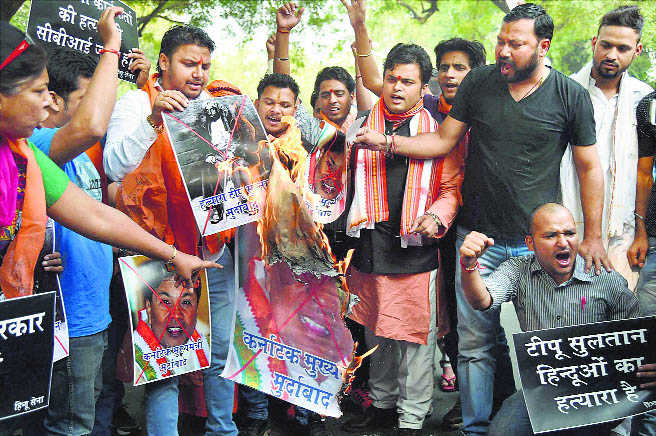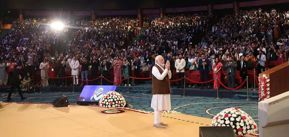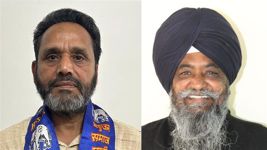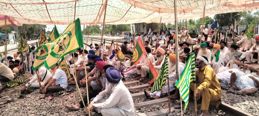
Unfortunately, Tipu’s legacy is being used by warring political parties to settle scores. An 18th-century political context cannot to be used as an instrument to inflame passions in the present. Hindu Sena activists protest in New Delhi against the Karnataka CM. PTI
Hema V. Raghavan
The present-day student, who finds it difficult even to remember the mobile numbers of his close friends, wonders why he should attempt at remembering historical dates. Many others in different professional fields argue why dwell on the past when that time can be spent on working out solutions to the many problems that beset us in the present? In this age of science and technology, when everyday is an advance on the previous day, when obsolescence is more of a welcome than a pejorative term, what is the use of history and more so, when there is unseemly wrangling about factual truth and fictional falsehood between the contending groups of historians.
The conflict has touched abysmal depths in recent times with a bright and scholarly rightwing academic denouncing the past historians of repute as “the pallbearers of Indic civilisation”. Present-day frenetic and fanatic attempts to interpret history to promote one's persuasions make one suspect the authenticity of many historical writings, adding to the cynicism on the value and worth of history. Historians try to reconstruct the past but they are aware of their limitations in doing so in wholeness or completeness. As historicists they construct theories out of the past and believe that historical awareness is crucial for adequate understanding in general or in a particular field.
The essence of human evolution and civilisation, history is not a "dead" subject. It provides the link between the past and the present, whether it relates to culture, tradition, religion or technology. Penelope Corfield writes that, “All people and peoples are living histories.” History connects us to our roots. A lack of a sense of our roots, that of being rootless, brings in its wake a sense of un-belonging and disturbing questions: “Who am I and who are we?” — Questions that do not ever lend themselves for a logical and satisfying answer. If there is no awareness of inherited legacy, there will be no sense of belonging to a society or a community or a group and this gives license to individuals to shape their lives with no commitment to fellow beings. History is absolutely basic for understanding the condition of being human. The ideas of the past and its linkages with the present help us to make the necessary modification to life in present times. If we fail to understand Hitler, how can we abhor the path of tyrannical dictatorship and arrogance of assumed racial superiority? If we know nothing about the two World Wars of the last century, we may not be able to avert the occurrence of yet another World War in the 21st century. Failing to understand history is at man's own peril.
It is true that when a historian writes, he does so with the awareness that the past is fundamentally different from the present and he looks at the past for its own sake and not to use his knowledge of the past to illuminate the the problems of the day. But a historian is not a mere compiler of facts but also a historicist, one who contextualises the available information and interprets it and thereby rejects universal and immutable interpretations that lie outside the context and yet hints at lessons to be learnt for the present and the future.
Hegel, one of the first to define historicism was of the view that society and human activities are defined by their history as everything is built up on what had been done in the past or through rejection of that which is viewed as an impediment to human progress. “To understand why a person is the way he is, you must put that person in a society; and to understand that society, you must understand its history and the forces that shaped it.” There is, for instance, the clash today about Tipu Sultan's legacy — whether he was a benign ruler who funded and preserved the temples in Karnataka (including the famous Ranganathaswamy temple in Srirangapatna) and who was a secular king and fought the British or whether he was a tyrant who massacred 700 Brahmins in Melcote and killed many innocents in the adjacent territories of Kerala and Tamil Nadu. The historical perspective demands that this controversy is understood not by sticking to details but by decoding these facts and placing them in the context of the 18th century when territorial annexation was a legitimate action of a king. Whether Tipu was a secular and just king, a freedom fighter or as an expansionist and a despot who converted people to Islam is a debate for historians, researchers and scholars to argue by placing the facts in the 18th century political context and not to be used as an instrument to inflame passions in the present day.
We see the lack of historical sense on the global level as well. The brutal ISIS acts of horror and terrorism show that it has neither read history nor learnt from it. ISIS, Boko Haram and Al-Qaida have been barbaric in their actions, killing thousands of innocents very much like the brutality unleashed by Pol Pot and Khmer Rouge in Cambodia or earlier by Hitler, inspiring fellow Germans with his Aryan myth against the Jews. These are to be understood as the cruel and barbaric acts of a few fanatic tyrants using the passionate appeal to emotions of people to make them blind to reason and humanity. In the backdrop of history, we realise that the present ISIS war is not a war where the Muslims of the world have united against Westerners, Christians, Jews and non-Islamists. It’s a war by a few ruthless leaders who have worked upon human psychology that applauds aggression using the toxic ideology of religious passion. Polarising the world into Muslims versus the rest is to be bankrupt of historical sense.
We need history to remain sane to learn and unlearn the positives and negatives, to understand the evolution of man and civilisation, to bind us as humanity, cutting across all geographical boundaries and man-made shadow lines, to build upon the foundation of the past, to modify, change and adapt and be in sync with human progress. We need it to leave behind for the future generation our own history as a reference point and because we can gain, both personally and as a society, from contemplating lessons from the past.
The writer is a former Principal of Gargi College, New Delhi.



























